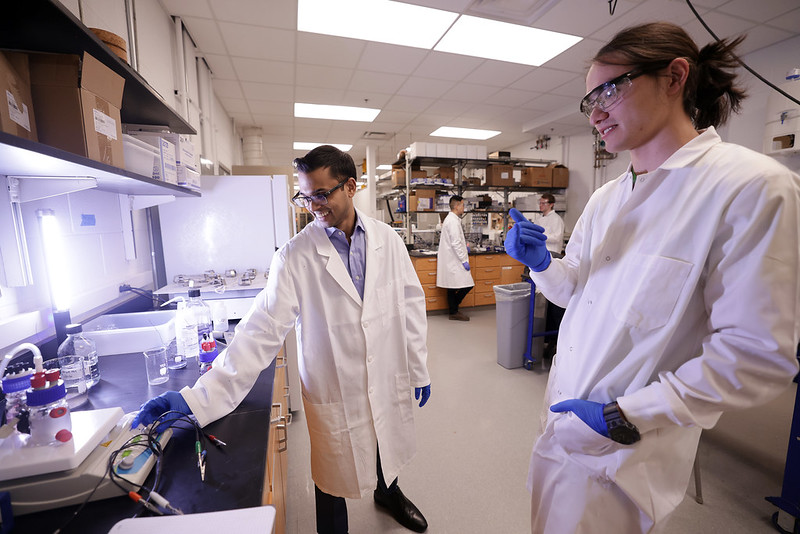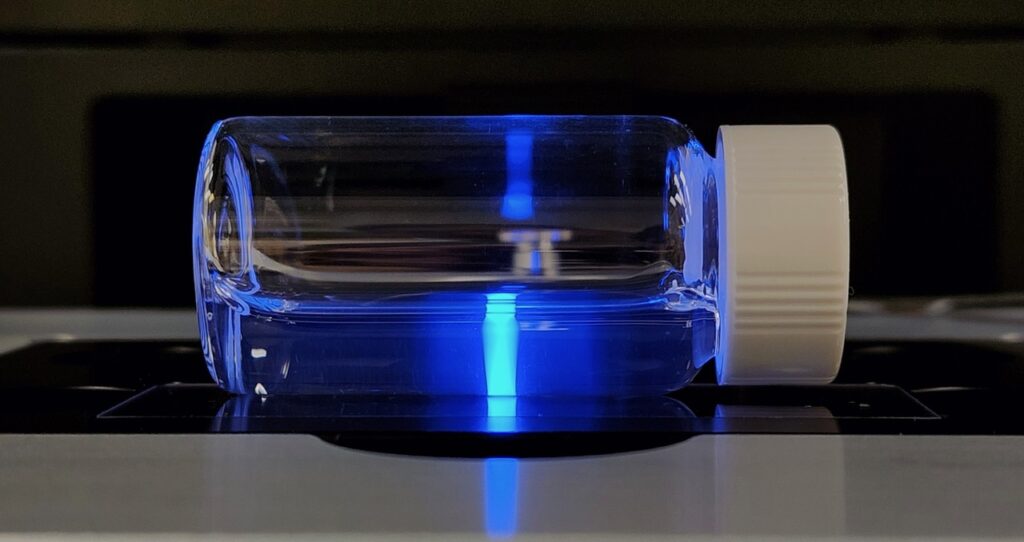
New funding supports carbon dioxide conversion research
Working towards combating climate change, the project focuses on developing an innovative hybrid nano-catalyst to efficiently convert carbon dioxide into methanol.

Working towards combating climate change, the project focuses on developing an innovative hybrid nano-catalyst to efficiently convert carbon dioxide into methanol.
Recent funding from the Michigan Materials Research Institute (MMRI) is supporting a new collaborative project led by Assistant Professor of Civil and Environmental Engineering Joshua Jack (PI) and Assistant Professor of Chemical Engineering Albert Liu (Co-PI).
Their project, “Integrating intermetallic CoPc-PtZn electrocatalysts with colloidal graphene quantum dots towards highly selective CO2 upgrading into methanol,” aims to convert the greenhouse gas carbon dioxide (CO2) into methanol, hoping to simultaneously address environmental concerns and create a valuable chemical resource.
At the core of the research is the development of a novel “hybrid nano catalyst,” which exploits the synergy between metal particles—specifically zinc and platinum—and an organic metalloporphyrin catalyst. The “hybrid nano catalyst” will first be synthesized and electrochemically analyzed by Jack and his lab. The performance will then be tuned by a graphene quantum dot supporting layer being developed by Liu’s lab. This approach aims to efficiently leverage renewable electricity to convert CO2 into methanol, a liquid chemical with vast potential as a fuel and in other products.

“Our vision is to pioneer an approach for converting waste CO2 into methanol using a state-of-the-art electrocatalyst composed of graphene quantum dot supported intermetallic compounds,” Liu said. “This innovative assembly aims to address and overcome the kinetic and selectivity challenges prevalent in current CO2 to methanol conversion technologies.”
The process innovated by Jack and Liu involves an initial conversion of CO2 into carbon monoxide (CO) before its subsequent transformation into methanol. Additionally, the team’s work includes the creation of specialized gas diffusion electrodes enhanced with carbon nanomaterials, designed to improve the conversion rate significantly.
“Electrified CO2 conversion presents an economical and sustainable pathway to mitigate climate change,” Jack said. “We are especially excited to explore new electrocatalysts for methanol synthesis due to its huge potential to decarbonize fuel and chemical manufacturing.”
The project’s anticipated outcome is to achieve a “carbon negative” or “net zero” footprint, effectively reducing atmospheric CO2 levels by capturing it directly from air or industrial emissions and transforming it into valuable methanol. The technology behind these efforts holds promise for scalability, paving the way for sustainable methanol production that could ultimately displace fossil fuels in the transportation sector and diminish the carbon footprint of chemical manufacturing.

“We are thrilled to receive the support from MMRI as it marks a critical step forward in our collaborative efforts to combat climate change through sustainable electrical materials design,” Liu said. “It enables us to bring together the teams’ diverse expertise into the design and development of novel electrocatalytic microenvironments that could result in pioneering advancements in the field of CO2 conversion technology.”
With implications that stretch beyond methanol production, the project is an opportunity to contribute to the development of green technologies that can lead to a more sustainable future. Principles and materials developed during this project could be adapted to broader CO2 conversion applications and thanks to advancements in electrocatalyst support design and nanomaterial synthesis, could also inspire new research avenues in CO2 utilization and renewable energy.
“Our motivation stems from the urgent need to address climate change and the growing global demand for sustainable energy solutions,” Liu said. “By focusing on the selective conversion of CO2 to methanol, we aim to tackle one of the significant challenges in utilizing CO2 as a resource rather than treating it as waste.”